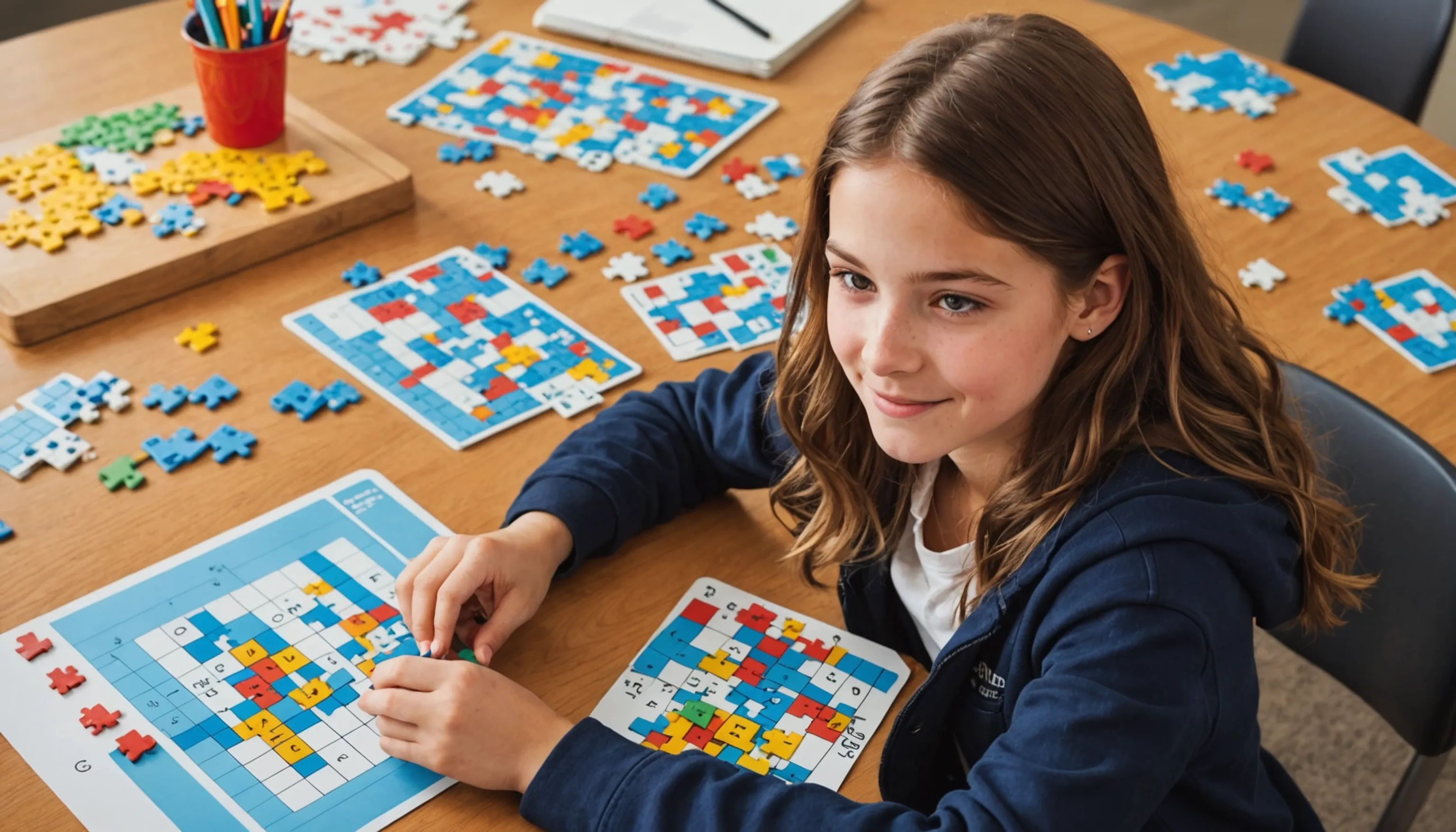Appreciation of Math
 HvWHenry van Wagenberg
HvWHenry van Wagenberg
Understanding the Appreciation of Math in Teenagers
Understanding the appreciation of math in teenagers is crucial for their academic development. At this stage, many young people begin to form their attitudes towards mathematics, which can significantly impact their future education and career choices. When teenagers see math as a valuable skill rather than a chore, they are more likely to engage with the subject and excel.
Factors influencing this appreciation include positive reinforcement from parents and teachers, real-world applications of math, and exposure to problem-solving situations. Encouraging a growth mindset can help teenagers view challenges in math as opportunities for learning.
The Importance of Math in Everyday Life
The importance of math in everyday life cannot be overstated. Mathematics is not just a subject learned in school; it is a skill used daily in countless situations. From managing finances to cooking, math plays a crucial role in helping individuals make informed decisions.
For instance, when budgeting household expenses, understanding basic math helps in calculating income, expenses, and savings. It enables families to allocate resources wisely and plan for future needs. Similarly, when shopping, math skills are essential for comparing prices, calculating discounts, and determining the best value for money.
In cooking, math is used to measure ingredients, adjust recipes, and understand cooking times. Whether doubling a recipe or converting measurements, having a grasp of fractions and proportions ensures successful meal preparation. Additionally, math is fundamental in various professions, from engineering to healthcare, where precise calculations are vital.
Moreover, math enhances critical thinking and problem-solving skills. It encourages logical reasoning and helps individuals approach problems systematically. This analytical mindset is beneficial not only in math-related tasks but also in daily decision-making processes.
In conclusion, recognizing the importance of math in everyday life fosters a deeper appreciation for the subject. Parents and teachers should emphasize real-life applications of math to help teenagers understand its relevance, motivating them to engage more with the subject.

How Math Enhances Problem-Solving Skills
Mathematics is more than just numbers and equations; it is a powerful tool that enhances problem-solving skills in teenagers. By engaging with mathematical concepts, young individuals learn to approach challenges methodically and creatively. This ability to solve problems is crucial not only in academic settings but also in everyday life.
One significant way math fosters problem-solving is by teaching logical reasoning. Teenagers learn to break down complex problems into smaller, manageable parts, allowing them to analyze each component. For example, solving a multi-step algebraic equation requires understanding relationships and applying logical sequences. This skill translates to real-world scenarios, where breaking down tasks can lead to effective solutions.
Additionally, math encourages critical thinking. Teenagers are often faced with puzzles or word problems that require them to think outside the box and apply various strategies. This practice cultivates a mindset that embraces challenges and seeks innovative solutions. Moreover, engaging with math promotes resilience; students learn that making mistakes is part of the learning process, which helps them develop a growth mindset.
Furthermore, math enhances decision-making skills. Whether determining the best way to allocate resources or evaluating risks, mathematical reasoning aids teenagers in making informed choices. As they analyze data and assess outcomes, they become more adept at evaluating information critically.
In summary, math is an essential tool that sharpens problem-solving skills, fostering logical reasoning, critical thinking, and informed decision-making in teenagers.
Strategies to Foster a Love for Math
Fostering a love for math in teenagers can be achieved through several effective strategies. First, make math relevant by connecting it to real-life situations, such as budgeting or cooking. This helps students see the practical applications of math.
Second, incorporate engaging activities like math games and puzzles, which can make learning fun and interactive. Third, encourage a growth mindset by praising effort over results, showing that perseverance is key to mastering math concepts.
Finally, create a supportive environment where questions are welcomed, allowing teenagers to explore math without fear of judgment.

Incorporating Math into Daily Activities
Incorporating math into daily activities is an excellent way to help teenagers see the relevance of mathematics in their lives. By seamlessly integrating math into routine tasks, parents and teachers can foster a deeper appreciation for the subject and enhance critical thinking skills.
One effective method is to involve teenagers in budgeting household expenses. This could include tracking monthly expenses, planning grocery shopping, or calculating savings for a family trip. By doing this, they learn about percentages, addition, and subtraction, while also understanding the value of money.
Cooking is another fantastic opportunity to incorporate math. When preparing meals, teenagers can practice measurements, conversions, and even ratios. For example, doubling a recipe requires them to multiply ingredients, while halving it involves division. This hands-on experience helps solidify their understanding of fractions and proportions.
Math can also be integrated into leisure activities. For instance, when playing board games or card games that involve counting or strategic planning, teenagers can engage with mathematical concepts in a fun and relaxed setting. Additionally, sports provide opportunities to calculate statistics, such as averages or percentages in player performance, fostering a competitive yet educational atmosphere.
Finally, parents can encourage teenagers to explore math-based apps or websites that offer interactive games and challenges. This not only enhances their skills but also makes learning enjoyable. By incorporating math into daily activities, teenagers can develop a positive attitude towards the subject, recognizing its significance in everyday life.
Encouraging Math Games and Puzzles
Encouraging math games and puzzles is a fantastic way to make learning mathematics enjoyable for teenagers. These activities not only enhance their math skills but also develop critical thinking and problem-solving abilities in a fun and engaging manner.
One popular approach is to introduce board games that emphasize strategic thinking and numerical skills. Games like Monopoly or Settlers of Catan require players to manage resources, calculate costs, and make financial decisions, all of which reinforce essential math concepts. Additionally, card games such as 21 or Uno can help teenagers practice addition and probability in a competitive yet entertaining setting.
Puzzles also offer an excellent opportunity for math learning. Sudoku, for example, encourages logical reasoning and pattern recognition, while logic puzzles challenge teens to think critically and work systematically. Online platforms and apps provide a wealth of math-based puzzles, allowing teenagers to solve problems at their own pace and track their progress.
Furthermore, creating a math challenge night with friends or family can spark enthusiasm. Teens can collaborate to solve problems or compete in math-related games, making the experience social and interactive. This not only reinforces their skills but also fosters a sense of community.
By integrating math games and puzzles into their routines, parents and educators can cultivate a positive attitude toward math, helping teenagers to view it as an engaging and rewarding subject rather than a chore.
Recognizing Achievements in Math
Recognizing achievements in math is crucial for building confidence and motivation in teenagers. Celebrating both small and large successes can encourage them to engage further with the subject. Simple gestures such as praising their effort on a challenging assignment or acknowledging improvements in test scores can go a long way.
Creating a reward system for reaching specific math goals, like mastering a new concept or solving a set number of problems, can also be effective. Additionally, displaying their work on a bulletin board or sharing their successes with family can foster a sense of pride and accomplishment.
Celebrating Math Milestones
Celebrating math milestones is essential for reinforcing a positive attitude towards mathematics among teenagers. Recognizing these achievements helps to motivate students and instills a sense of pride in their mathematical abilities. Milestones can vary from mastering a new concept to achieving a high score on a math test or completing a challenging project.
One effective way to celebrate these milestones is through ceremonies or events. Schools can organize award ceremonies where students receive certificates or accolades for their accomplishments. This public recognition not only boosts their confidence but also encourages peers to strive for similar goals.
Parents can also play a significant role in celebrating math milestones at home. Simple gestures like hosting a small celebration or rewarding their teen with a favorite treat can make a significant impact. For example, after completing a difficult math unit or improving their grades, parents might plan a fun outing or a special dinner to acknowledge their hard work.
Additionally, creating a milestone chart at home can visually represent their progress. Each time a goal is achieved, they can mark it on the chart, creating a sense of accomplishment and motivation to reach the next goal. This visual representation serves as a reminder of their capabilities.
Ultimately, celebrating math milestones fosters a positive learning environment, encouraging teenagers to see math not just as a subject, but as a series of achievable challenges that contribute to their overall growth and confidence.
Creating a Positive Math Environment
Creating a positive math environment is essential for encouraging teenagers to engage with mathematics and develop a love for the subject. A supportive atmosphere can significantly impact their confidence and willingness to tackle challenges. Here are some strategies to foster a positive math environment:
- Encouragement and Praise:Regularly acknowledge and praise efforts, not just results. Celebrate improvements and milestones, reinforcing that hard work leads to success.
- Open Communication: Create a space where students feel comfortable asking questions and expressing their concerns. Encourage discussions about math concepts, allowing them to share their thoughts and ideas.
- Collaborative Learning: Promote group work and collaborative problem-solving. When teenagers work together, they can learn from each other and build a sense of community. This approach helps reduce anxiety associated with math.
- Resource Availability: Provide access to various resources, such as textbooks, online tools, and math games. Having diverse materials encourages exploration and helps cater to different learning styles.
- Positive Role Models: Share stories of individuals who have excelled in math and related fields. Highlighting success stories can inspire teenagers and show them the potential of math in real-world applications.
By implementing these strategies, parents and educators can cultivate a positive math environment that nurtures curiosity and resilience in teenagers. This supportive atmosphere encourages them to view math as an exciting challenge rather than a daunting task, ultimately fostering a lifelong appreciation for the subject.
